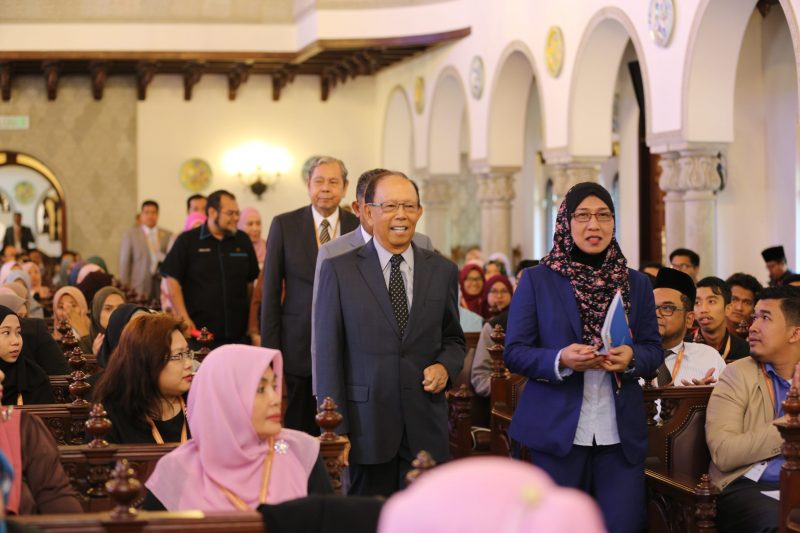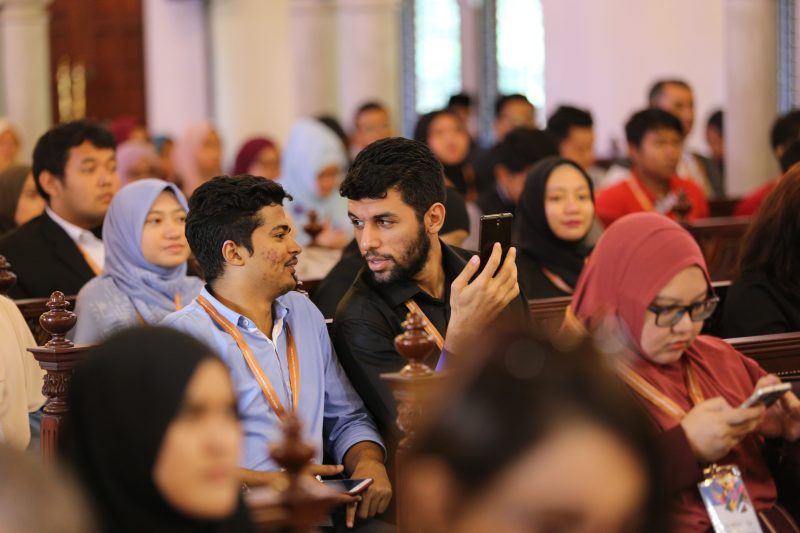Passion Led Them Here
A new business model is needed to move forward towards a circular economy. A model that marries profit and inclusivity. The result of which is social entrepreneurship, and it’s been looked upon as the future of business. This article first appeared in In Focus issue 4 magazine.
Social enterprise has been looked upon as an entrepreneur’s way of trying to change the world and promote inclusivity. Being more than just a business trend, social entrepreneurship has caught momentum as a way to simultaneously manage a business and elevate the lives of others as well as the environment. Furthermore, technology has made it possible for social enterprise to take off in a grand manner. This is because the internet makes it easier and inexpensive to promote social enterprise, crowdfunding as well as microlending.
Everything begins with education. So, with the intention to spur social enterprise development and plant social entrepreneurship roots in universities, a two-day forum was organised by WIEF Education Trust, the Ministry of Education Malaysia and Higher Education Leadership Academy (AKEPT) in collaboration with International Islamic University Malaysia, last October in Kuala Lumpur. More and more, universities play a prominent role in supporting and developing social enterprises. These academic institutions could develop, for example, bespoke academic social enterprise modules, internships in a social enterprise and guidance for students establishing their own social enterprise.
The AKEPT-WIEF Social Enterprise Forum had around 300 participants who were mainly higher education students. Over 30 experts from various countries including India, New Zealand and the Philippines, shared their insights, experiences as well as opinions on how to move forward in terms of social entrepreneurship. During its five plenary sessions and six masterclasses, topics covered included the potential of social enterprise development in universities, how governments can play a role, some lessons from success stories, how to commercialise the businesses and a few experiences from abroad.
One of the main takeaways from the experts was that social entrepreneurship requires perseverance and careful management of finances as well as passion. It’s a fine balance where too much of one thing can topple the balance as well as minimise the chances of one’s success as a social entrepreneur.
Keeping an eye on the bottom line of the business while being socially responsible is no mean feat. In fact, it has been admitted by many just how difficult it can be and echoed by session speaker Sasibai Kimis, founder of Earth Heir, who said, ‘Social entrepreneurship is a scary journey. We are not only answering to our clients but also to our beneficiaries. The first few years, I didn’t pay myself and lived on my savings. There were many times I wanted to give up but what kept me going is knowing that we are building something for the nation. All businesses in Malaysia should have a do-good component. Social entrepreneurship is a new model for businesses.’
Naturally, nothing good comes easy. The speakers agreed that although passion is good but it alone cannot fuel a business. ‘You must be so flexible, nimble on your feet and you must have that blueprint of what you want to achieve. It is not just about passion. You must also have logic,’ said Masterclass speaker Joycelyn Lee, long-time social entrepreneur and co-founder of Pit Stop Café in Kuala Lumpur.

Unleashing its Potential
It starts with education and universities have an important role to play by instilling the benefits of social enterprises among students through their teaching. During a plenary session, Syed Mahmudul Huq, chairman of Bangladesh Shrimp and Fish Foundation, observed a mismatch between universities and life of students, and that this was common in many developing countries. ‘The solution to this was to assist students in identifying their problems in their communities and help them come up with practical solutions to improve their situation and help in economic contribution,’ said Syed.
During the same plenary session, Professor Dr Hafid Abbas from the State University of Jakarta, noted that to develop university excellence there needed to be a training centre to provide technological training among other required skills to assist towards this development. The speakers concurred that universities should first set the example of being a social enterprise itself and help to bridge this mismatch. Gomer Padong from the Philippines Social Enterprise Network (PhilSEN),
emphasised the need for governments to play a role in the sub sectors and help to mainstream social entrepreneurship in the education system.
Examples of Commercialising Social Enterprises
In Indonesia, Jamil Abbas of the Rahmania Foundation explained, the Foundation provided commercial financing and Islamic financial assistance such as zakat as well as waqf for the neediest children in the country. ‘Unfortunately, society needs more,’ he said. Jamil established other social enterprises to help people make money and stay with their families. He’s currently working on a solution to help solve the garbage problem in Indonesian towns and at the same time help the differently-abled people make a living.
Nurfarini Daing, co-founder of the Youth Trust Foundation in Malaysia, dedicates her time towards supporting youth projects that contributes to nation building. During a plenary session, she pointed out that many social enterprise companies faced a social mission drift along the way because they weren’t ready. ‘It’s important that we’re aware of the balance between our social impact and the business return of investment,’ she said and admitted that there was no real formula to finding this balance.
Jerryson Abraham Doss, co-founder of Viva Starfish Sdn Bhd in Malaysia, had helped millions of people in need of education. He believed that in order for social work to have an impact it must be continuous. He used to sell bottles of water to earn money to help children in their education. He also mentioned that success comes with knowing how to manage your finances and the passion you have about your business. ‘Choose something that’s very close to your heart,’ he advised.
Barely 21 years old during the time of the forum, Anand Chowdhary was one of the youngest entrepreneurs. He founded Oswald Labs in 2016 and built a web tool to help people with dyslexia to read. ‘Someone told me how powerful the tool is, and that she used it for her kids and students,’ he said. So, he decided to drop out of school and worked on it, full time. Today, he offers it for free to the public but charges big corporations that can afford to pay.

Last Words
Masterclass speaker Vishnu Swaminathan from Ashoka USA, defined social enterprise as a way for enterprises to ‘make money, re-deploy, open source and help others copy’. In starting a business, a main challenge is funding. During the Masterclass that discussed how and where to look for funds had Vishnu advising fresh entrepreneurs to avoid complex and small money when looking for funds. He insisted that focussing on individuals for funding could be a better strategy. Even though getting flexible money might be a challenge, he encouraged this and reminded how industries such as medical as well as education got the most funding. Also, when it came to social entrepreneurship, size didn’t matter, ‘What matters is how you transform your own industry, it’s no longer about how big your organisation is,’ he insisted.
Final takeaway from the AKEPT-WIEF Social Enterprise Forum came from Royston Braganza, CEO of Grameen Capital India Limited, who listed pillars that young entrepreneurs should have. They included: education, innovation, a social ecosystem, policy, institutional framework and technology. Royston told participants that they should integrate work with their courses and to look at Sustainable Development Goals or SDGs. ‘There has to be a positive contribution to the economy and it should benefit all stakeholders,’ he concluded.
Social entrepreneurship, though a tough road to travel on, brings deep satisfaction. This was obvious from the various speakers during the sessions. It wasn’t only the positive social impact which they created but also the recognition for wanting to make a change while contributing to the economy. Furthermore, in today’s economic climate, the speakers unanimously agreed that social entrepreneurship is the future of business. Therefore, the future of business is purpose.
Ingredients for social entrepreneurship from speakers of AKEPT-WIEF Social Enterprise Forum:
- keep a different perspective to doing good
- a strong support system
- build and maintain a network
- for students, integrate work and studies
- keep an eye on the balance of social impact and return on investment (ROI)
About WET
WIEF Education Trust is the education pillar of WIEF Foundation and it believes that education is key to progress. Through its various programmes, it aims to garner support as well as resources globally to provide educational opportunities for young people, contribute to the intellectual property of the Foundation and provide platforms for entrepreneurs from various backgrounds to network, acquire knowledge and form collaborations.
More details on WET: (QRcode) https://wief.org/wief-education-trust/
Main photo by Perry Grone on Unsplash





